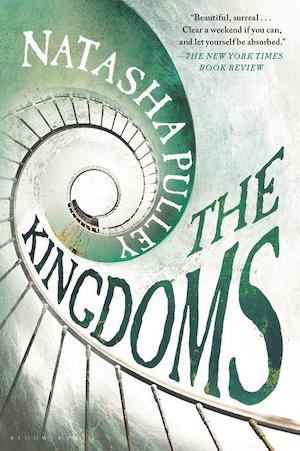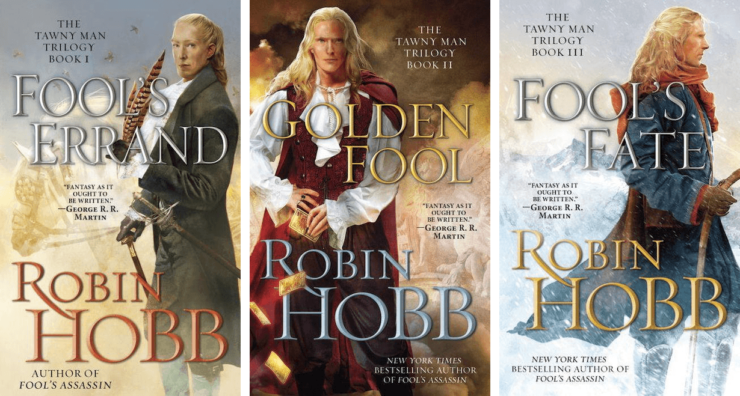Golden Fool is the second book of Robin Hobb’s Tawny Man Trilogy. It’s about a retired assassin, Fitz, and his best friend, the eponymous Fool. All three books are narrated in first person, by Fitz. I know that there are endless assassin narrators in other books who tend to be snarky and far too cool. They wear unnecessary buckles. Fitz isn’t cool at all.
He is lonely, neurotic, occasionally selfish, funny in an arid sort of way and worried about being middle aged. The Fool, meanwhile, is a histrionic clairvoyant. He won’t say if he’s really a man or a woman, how old he is, or even much about where he’s from. He plays endless roles and although he is, really, Fitz’s only friend, he has lives upon lives that Fitz isn’t allowed to see, full of people he doesn’t know.
There’s an unobtrusive moment about halfway through the book. It happens just before a colossal fight, sparked by a misunderstanding about some flowers. The Fool thinks Fitz left them for him, but in fact they’re from a garden maid we never really meet. But nobody just says ‘it was Garetha the garden maid’, which would have been the narratively efficient thing to do. Far more realistically—they live in a castle with hundreds of people in it—neither of them quite know who she is and they have to work it out between them.
“The garden woman. She is about your age. Freckles on her face and arms. Hair the colour of clean straw.”
I called the woman’s image back into my mind. “Freckles, yes. Her hair is light brown, not gold.”
He clenched his eyes shut. “Then it must have darkened as she grew older.”
That Fitz goes straight into pugnacious pedantry is in itself very true to life. He’s annoyed and becoming more annoyed the longer he has to spend working out who this irrelevant woman is. What’s brilliant, though, is that he does it over straw. He grew up in stables and now he’s having to work as a manservant. The Fool, however, was the King’s jester and now lives rather the high life as a wealthy nobleman. He has no business whatsoever with straw. In the face of everything they’re really fighting about, Fitz is snatching back one image that belongs to him. It says volumes about both of them.
This trilogy has dragons in it, and prophets, and sweeping landscapes, but it has these pin-sharp moments too. Fitz is one of the most meticulously imagined characters I’ve read, in one of the most meticulously imagined worlds. The details make the books into breezeblocks, each one coming, I think, to at least six hundred pages. Honestly, I wish they were all twice as long.
Originally published July 2015.
Buy the Book


The Kingdoms
Natasha Pulley, the author of The Watchmaker of Filigree Street, The Bedlam Stacks, and The Lost Future of Pepperharrow, studied English literature at Oxford University and earned a creative writing M.A. at the University of East Anglia. She lives in Bristol, England.










